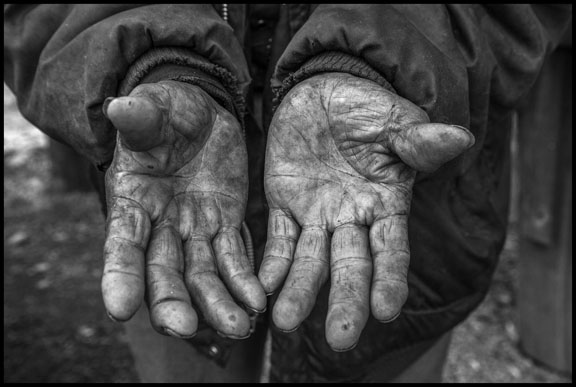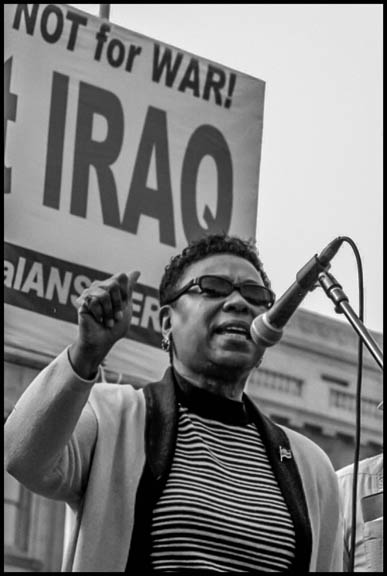| |||
| |||
[. . .]
Online Interviews and Presentations Exploitation or Dignity - What Future for Farmworkers UCLA Latin American Institute Based on a new report by the Oakland Institute, journalist and photographer David Bacon documents the systematic abuse of workers in the H-2A program and its impact on the resident farmworker communities, confronted with a race to the bottom in wages and working conditions. https://www.youtube.com/watch?v=UXKa2lHJXMs Organizing during COVID, the intrinsic value of the people who grow our food Sylvia Richardson - Latin Waves Media How community and union organizers came together to get rights for farm workers during COVID, and how surviving COVID has literally been an act of resistance. https://latinwavesmedia.com/wordpress/organizing-during-covid-the-intrinsic-value-of-the-people-who-grow-our-food/ Report Details Slavery-Like Conditions For Immigrant Guest Workers Rising Up With Sonali Kohatkar https://www.oaklandinstitute.org/report-details-slavery-conditions-immigrant-guest-workers The Right to Remain http://www.franknews.us/interviews/415/the-right-to-remain Beware of Pity http://www.franknews.us/interviews/525/beware-of-pity En Español Ruben Luengas - #EnContacto Hablamos con David Bacon de los migrantes y la situación de México frente a los Estados Unidos por ser el principal país de llegada a la frontera de ese país. https://rubenluengas.com/2021/03/video-mexico-estados-unidos-migracion-y-suenos-rotos-encontacto/ Jornaleros agrícolas en EEUU en condiciones más graves por Covid-19: David Bacon SomosMas99 con Agustin Galo Samario https://www.youtube.com/watch?v=YWQSvM9s1lw "Los fotógrafos tomamos partido" Entrevista por Melina Balcázar Moreno - Milenio.com Laberinto http://www.milenio.com/cultura/laberinto/david_baconm-fotografia-melina_balcazar-laberinto-milenio_0_959904035.html David Bacon comparte su mirada del trabajo agrícola de migrantes mexicanos en el Museo Archivo de la Fotografia http://www.cultura.cdmx.gob.mx/comunicacion/nota/0038-18 Online Photography Exhibitions Documentary Matters - View from the US Social Documentary Network Four SDN photographers explore themes of racial justice, migration, and #MeToo https://www.youtube.com/watch?v=fWl-uENA7SQ&t=1641s There's More Work to be Done Housing Assistance Council and National Endowment for the Arts This exhibition documents the work and impact of the struggle for equitable and affordable housing in rural America, inspired by the work of George “Elfie” Ballis. https://www.thereismoreworktobedone.com/david-bacon Dark Eyes A beautiful song by Lila Downs honoring essential workers, accompanied by photographs https://www.youtube.com/watch?v=bdC2gE3SNWw A video about the Social Justice Photography of David Bacon: https://drive.google.com/file/d/14TvAj5nS08ENzWhw3Oxra4LMNKJCLF4z/view  WORK AND SOCIAL JUSTICE: The David Bacon Archive exhibition at Stanford Libraries https://exhibits.stanford.edu/bacon/browse Exhibited throughout the pandemic in the Cecil H. Green Library at Stanford. The online exhibition (https://exhibits.stanford.edu/bacon), which includes additional content not included in the physical show, is accessible to everyone, and is part of an accessible digital spotlight collection that includes significant images from this body of work. For a catalog: (https://web.stanford.edu/dept/spec_coll/NonVendorPubOrderform2017.pdf) IN THE FIELDS OF THE NORTH Online Exhibit Los Altos History Museum https://www.losaltoshistory.org/exhibits/in-the-fields-of-the-north/ VIRTUAL TOUR OF THE EXHIBITION - IN THE FIELDS OF THE NORTH History Museum of Tijuana RECORRIDO VIRTUAL DE LA EXPOSICIÓN - EN LOS CAMPOS DEL NORTE Museo de Historia de Tijuana https://www.facebook.com/542258639265202/videos/659536991515786 The exhibitions in the following list were scheduled before the current COVID-19 crisis. Public gatherings are now being rescheduled. IN THE FIELDS OF THE NORTH / EN LOS CAMPOS DEL NORTE October 24 - December 19, 2021 Kansas City Public Library, Kansas City, KS MORE THAN A WALL - THE SOCIAL MOVEMENTS OF THE BORDER Spring, 2022 San Francisco Public Library DEPORTATIONS Rescheduled for a date when the gallery reopens Uri-Eichen Gallery, Chicago In the Fields of the North / En los Campos del Norte Photographs and text by David Bacon University of California Press / Colegio de la Frontera Norte 302 photographs, 450pp, 9”x9” paperback, $34.95 (in the U.S.) order the book on the UC Press website: ucpress.edu/9780520296077 use source code 16M4197 at checkout, receive a 30% discount En Mexico se puede pedir el libro en el sitio de COLEF: https://www.colef.mx Los Angeles Times reviews In the Fields of the North / En los Campos del Norte - click here THE REALITY CHECK - David Bacon blog Books by David Bacon Illegal People -- How Globalization Creates Migration and Criminalizes Immigrants (Beacon Press, 2008) | |
Copyright © 2021 David Bacon Photographs and Stories, All rights reserved. you're on this list because of your interest in david bacon's photographs and stories Our mailing address is: David Bacon Photographs and Stories address on request Oakland, Ca 94601 | |

